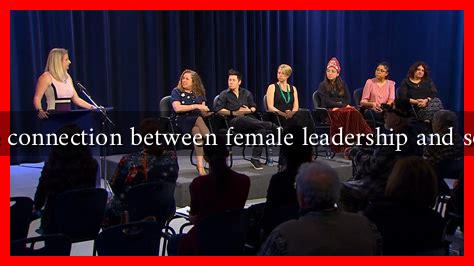-
Table of Contents
- What is the Connection Between Female Leadership and Social Justice?
- The Importance of Female Leadership
- Female Leadership and Social Justice: A Symbiotic Relationship
- Political Leadership
- Corporate Leadership
- Community Activism
- Statistics Highlighting the Impact of Female Leadership
- Challenges Faced by Women Leaders
- Conclusion: The Path Forward
What is the Connection Between Female Leadership and Social Justice?
In recent years, the conversation surrounding female leadership and social justice has gained significant traction. As societies strive for equality and fairness, the role of women in leadership positions has become increasingly vital. This article explores the intricate relationship between female leadership and social justice, highlighting the impact of women in power on societal change.
The Importance of Female Leadership
Female leadership is not just about having women in positions of power; it is about the unique perspectives and experiences they bring to the table. Women leaders often advocate for policies that promote social justice, equity, and inclusivity. Here are some key reasons why female leadership is essential:
- Diverse Perspectives: Women leaders often approach problems differently, considering the needs of marginalized groups.
- Empathy and Collaboration: Female leaders tend to prioritize collaboration and empathy, fostering a more inclusive environment.
- Role Models: Women in leadership positions serve as role models for younger generations, inspiring them to pursue their ambitions.
Female Leadership and Social Justice: A Symbiotic Relationship
The connection between female leadership and social justice is evident in various sectors, including politics, business, and community organizations. Women leaders often champion social justice initiatives, advocating for policies that address systemic inequalities. Here are some notable examples:
Political Leadership
Women in political leadership roles have been instrumental in advancing social justice. For instance, Jacinda Ardern, the former Prime Minister of New Zealand, has been praised for her empathetic leadership style and her commitment to social issues, including mental health and child poverty. Under her leadership, New Zealand implemented policies aimed at reducing inequality and improving social welfare.
Corporate Leadership
In the corporate world, female leaders are increasingly recognized for their contributions to social justice. Companies led by women tend to prioritize corporate social responsibility (CSR) initiatives. A study by McKinsey & Company found that organizations with more women in leadership roles are more likely to invest in social and environmental initiatives. For example, companies like Unilever and Patagonia have made significant strides in promoting sustainability and ethical practices under female leadership.
Community Activism
Women have historically been at the forefront of social justice movements. Figures like Malala Yousafzai and Angela Davis have used their platforms to advocate for education, racial equality, and women’s rights. Their leadership has inspired countless individuals to engage in activism and push for systemic change.
Statistics Highlighting the Impact of Female Leadership
Research consistently shows that female leadership correlates with positive social outcomes. Here are some compelling statistics:
- According to a report by the World Economic Forum, countries with higher female political representation tend to have better social welfare policies.
- A study published in the Harvard Business Review found that companies with women in leadership roles outperform their male counterparts in terms of profitability and productivity.
- The Global Gender Gap Report indicates that closing the gender gap in leadership could add $28 trillion to global GDP by 2025.
Challenges Faced by Women Leaders
Despite the positive impact of female leadership on social justice, women still face significant challenges in attaining and maintaining leadership positions. These challenges include:
- Gender Bias: Women often encounter stereotypes and biases that undermine their authority and capabilities.
- Work-Life Balance: The expectation to balance professional and personal responsibilities can hinder women’s career advancement.
- Lack of Representation: Women remain underrepresented in leadership roles across various sectors, limiting their influence on social justice initiatives.
Conclusion: The Path Forward
The connection between female leadership and social justice is undeniable. Women in leadership positions not only bring diverse perspectives but also drive meaningful change in society. As we continue to advocate for gender equality, it is crucial to support and empower women leaders. By doing so, we can create a more just and equitable world for all.
In summary, fostering female leadership is not just a matter of equality; it is a necessary step toward achieving social justice. As we look to the future, let us commit to breaking down barriers and amplifying the voices of women in leadership roles.
For further reading on the impact of female leadership on social justice, you can explore resources from organizations like UN Women and McKinsey & Company.

